Managing personal finances can be challenging, especially for beginners. However, learning how to budget weekly spending using practical weekly budgeting tips and budgeting templates can significantly improve your financial awareness and long-term financial well-being.
According to a 2023 survey by NerdWallet, 84% of Americans with a monthly budget report occasionally exceeding it, highlighting the difficulty in adhering to monthly budgeting plans.
In contrast, a weekly budgeting approach allows for more frequent monitoring and adjustments, which can help prevent overspending.
A study by the National Endowment for Financial Education found that budgeting helps people feel more in control, confident, and secure with their finances. Implementing a weekly budgeting system can provide the structure and flexibility needed to achieve these outcomes.
In this article, H2T Funding will explore practical weekly budgeting tips that every beginner should know, helping you take control of your finances and work towards your financial goals.
Key takeaways:
- Weekly budgeting helps you manage money in smaller, more manageable segments, ideal for staying on track with spending and savings goals.
- Switching from a monthly to a weekly budget offers better spending control, flexibility for unexpected expenses, and improved financial awareness.
- A good weekly budget follows the 50/30/20 rule 50% for necessities, 30% for wants, and 20% for savings or debt repayment.
- Learn how to budget weekly spending by determining your income, listing expenses, setting goals, allocating funds, and tracking progress regularly.
- Use weekly budget planners or templates to organize your finances easily and visualize where your money goes.
- Tailor your approach for unique cases such as irregular income, unexpected expenses, or weekly paychecks to keep your budget flexible and effective.
- Adjust your weekly budget often to reflect changes in income or expenses, focusing on progress over perfection.
- Consistent tracking builds financial accountability, improves credit health, and strengthens long-term financial well-being.
1. What is a weekly budget?
A weekly budget is a short-term financial plan that breaks down your income and expenses into weekly segments instead of monthly or annual ones. This approach helps you manage cash flow more precisely, track spending patterns frequently, and make quick adjustments when needed.
Unlike a monthly budget that often hides small overspending habits until the end of the month, a weekly budget provides regular checkpoints to stay accountable and aligned with your goals.
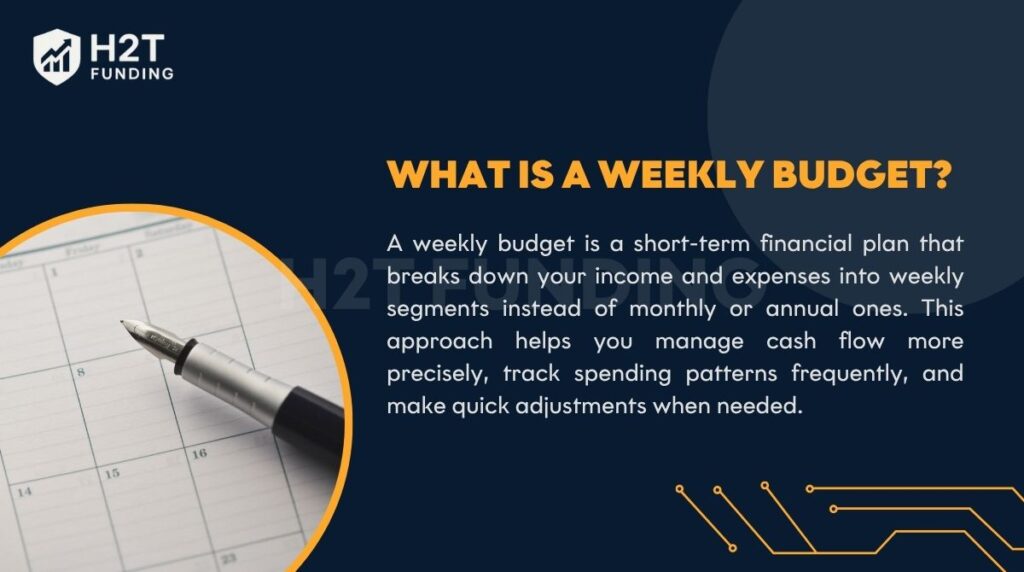
Creating a weekly budget usually starts with calculating your net weekly income (the amount you receive after taxes and deductions). Then, you allocate funds to essential categories such as housing, food, utilities, transportation, and savings. By limiting your focus to just seven days at a time, you reduce the chance of running short before the next paycheck and gain better control over discretionary spending.
2. What makes a good weekly budget?
A good weekly budget is realistic, balanced, and flexible enough to handle unexpected expenses without derailing your progress. Financial experts recommend applying the 50/30/20 rule on a weekly scale:
- 50% of your income goes toward necessities: rent, groceries, utilities, insurance, and transportation.
- 30% covers discretionary spending: dining out, entertainment, hobbies, and personal treats.
- 20% is set aside for savings, investments, or debt repayment.
However, there’s no one-size-fits-all formula. A good weekly spending budget should reflect your actual income, lifestyle, and priorities. For example, someone earning $800 per week might plan:
- $400 for essentials
- $240 for wants
- $160 for savings or debt repayment
The key is to stay consistent and track your expenses regularly. Over time, this consistency strengthens your financial awareness, improves your credit health, and supports long-term financial well-being.
If you often feel stretched thin by the end of the month, switching to a weekly budgeting system can make money management more approachable and less overwhelming. You’ll see results faster, make smarter financial decisions, and build a sustainable habit of accountability.
3. Why choose a weekly budget?
Switching to a weekly budget is a game-changer for people who need more frequent check-ins to stay on track and want budgeting tips to save money effectively each week. It offers clarity and discipline without the overwhelming complexity of a monthly plan.
For me, the biggest difference came when I started tracking my spending weekly. I used to budget monthly, but getting paid mid-month made me overspend on impulse buys and takeout.
The real eye-opener was seeing exactly how much I spent on coffee and lunch every single week. When you see a number like “$45 a week on coffee” instead of “$180 a month,” it hits differently. Here are three key benefits that make weekly budgeting an excellent choice:
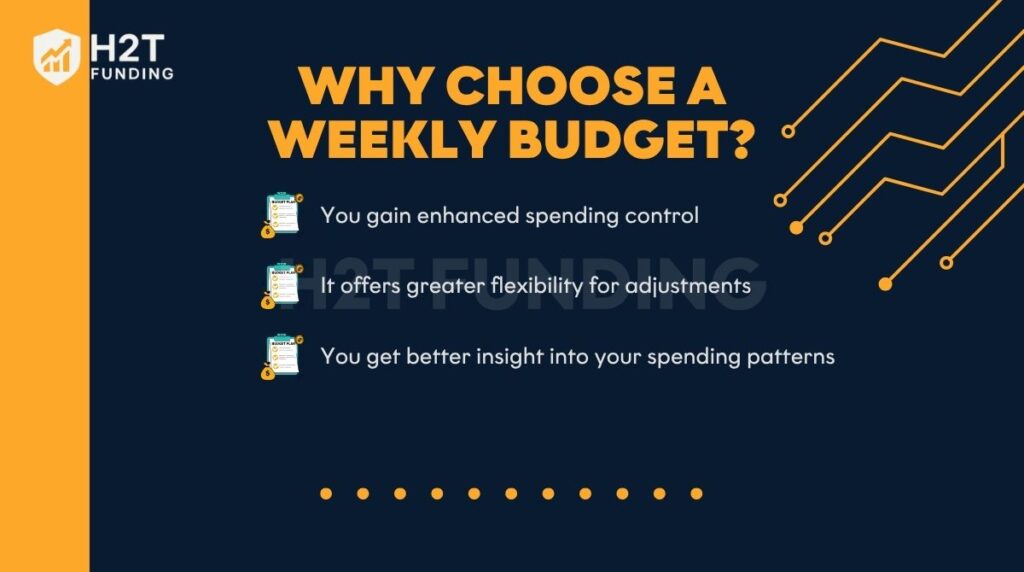
2.1. You gain enhanced spending control
A weekly budget lets you keep a close eye on your cash flow and understand what budgeting tips would help you stay on track financially. By checking your spending each week, you can spot overspending on necessities early and fix it before it grows. This approach is perfect for anyone trying to master how to budget a weekly paycheck.
2.2. It offers greater flexibility for adjustments
Unexpected expenses are a part of life. With a weekly budget, you can adjust funds for sudden costs like car repairs or gifts without disrupting your plan. If you’re balancing saving and investing, read our guide on saving vs investing pros and cons to decide where your money works best. This is a lifesaver if you have a variable income, like a freelancer or a commission-based worker.
2.3. You get better insight into your spending patterns
By tracking expenses in shorter timeframes, you gain a clearer picture of your spending habits and improve your financial awareness, which is key to building good credit scores and stronger financial well-being.
You’ll notice patterns you never saw before, like how you spend a little too much on groceries every Tuesday or how much you really spend on streaming services. This awareness helps you make smarter, more informed decisions about your money.
Of course, it’s not a magic bullet. It takes consistent effort to track and update your budget each week, which can feel like a chore if you’re busy. And for those with fixed monthly expenses, it can be tricky to align them with a weekly framework. But the benefits almost always outweigh the drawbacks.
4. Comparing budgeting frequencies: Daily, weekly, monthly, and biannually
To choose the right budgeting schedule, daily, weekly, monthly, or biannually, start by answering key questions about your income and goals:

- How often do you receive income? If you get paid weekly, a weekly budget aligns seamlessly with your cash flow. Monthly or irregular income might suit monthly or biannual budgets.
- How much time can you dedicate to budgeting? Daily budgeting requires daily check-ins, while biannual budgeting needs minimal effort but less frequent oversight.
- Do you need tight control over spending? If impulsive purchases are a problem, daily or weekly budgets offer closer monitoring.
- Are your expenses predictable? Stable expenses favor monthly or biannual budgets, while variable costs benefit from weekly or daily tracking.
By reflecting on these questions, you can choose a budgeting frequency that matches your needs and learn how to make a weekly budget that keeps your financial accountability high and spending consistent.
For example, Alex chose a weekly budget because his weekly paycheck and variable freelance gigs required frequent adjustments. The table below compares these options to guide your decision further.
| Budgeting frequency | Pros | Cons | Best For |
|---|---|---|---|
| Daily | Time-intensive. It can feel overwhelming. Less focus on long-term goals. | Time-intensive. It can feel overwhelming. Less focus on long-term goals. | People with highly variable daily expenses or those needing strict spending control. |
| Weekly | Enhanced spending control. Greater flexibility for adjustments. Easy to track weekly expenses examples. | Requires weekly updates. May not align with monthly bills. | Those with weekly paychecks or seeking frequent financial check-ins. |
| Monthly | Aligns with common bill cycles. Less frequent updates are needed. Good for long-term planning. | Less granular control. Risk of overspending mid-month. | People with stable monthly incomes and predictable expenses. |
| Biannually | Minimal time commitment. Focuses on big-picture goals. Suits long-term financial planning. | Limited ability to adjust quickly. May miss short-term overspending. | Those with stable finances and minimal need for frequent adjustments. |
See more related articles:
5. How to weekly budget: Create a weekly budget in 5 simple steps
Mastering weekly budgeting tips helps you gain control, whether you need a weekly budget plan for students, work freelance, or manage a weekly paycheck. This practical guide on how to create a weekly budget breaks the process into five actionable steps, designed to be straightforward yet effective.
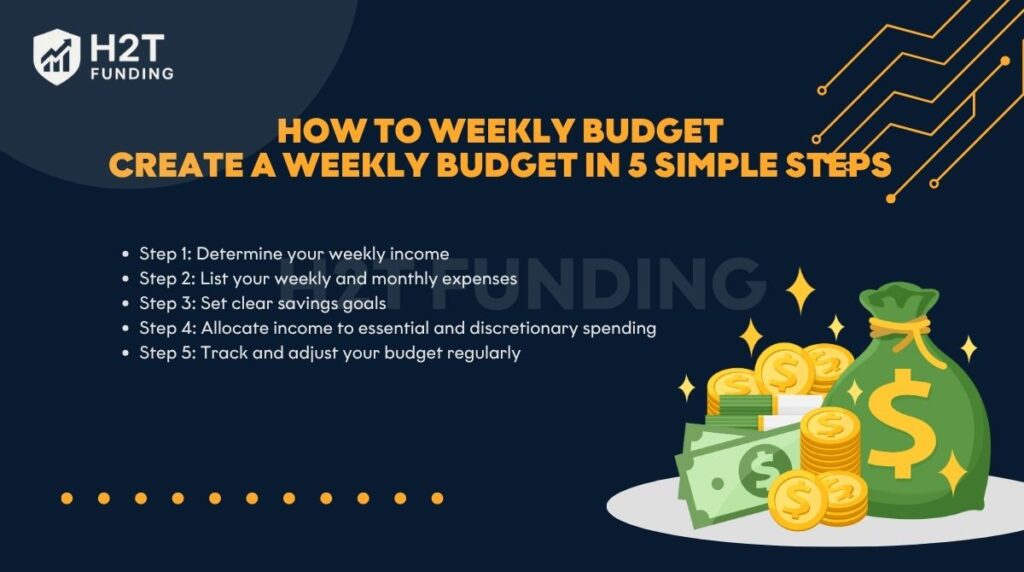
Quick overview: 5 steps to weekly budgeting success:
- Step 1: Determine your weekly income
- Step 2: List your weekly and monthly expenses
- Step 3: Set clear savings goals
- Step 4: Allocate income to essential and discretionary spending
- Step 5: Track and adjust your budget regularly
5.1. Step 1: Determine your weekly income
First, calculate your total weekly income after taxes (net income). This is the foundation of your budget.
- Regular income: If you’re paid weekly, this is straightforward. Learning how to budget when you get paid weekly is essential for maintaining consistency and avoiding budgeting myths like assuming more paychecks mean more disposable cash. For example, a $3,000 monthly net income is about $693 per week ($3,000 ÷ 4.33).
- Bonuses and commissions: A 2023 Bank of America guide suggests budgeting bonuses as one-time boosts to savings or debt repayment instead of using them for regular spending.
- Side hustles or freelance work: If your income varies, use the lowest average from the past three months for consistency.
Let’s look at Marcus, a freelance photographer. His net earnings over the last three months were:
- March: $2,200
- April: $2,800
- May: $2,500
To get his weekly income, he averages his monthly income ($2,500) and divides it by 4, giving him an estimated weekly income of $625. This realistic number is his starting point for the rest of his budget. A weekly budget example like this helps beginners understand how income fits into weekly budgeting tips and real financial planning.
Why this matters: Accurate income estimation is the key to building a budget that actually works. It helps you prevent overspending during high-income weeks and stay consistent with savings goals.
5.2. Step 2: List your weekly and monthly expenses
Next, identify all your expenses to see where your money goes. Categorizing weekly expenses examples helps with better planning and prevents overspending. Review bank statements or receipts from the past two months to capture both fixed and variable costs.
- Fixed expenses: These stay consistent, like rent ($300/week if monthly rent is $1,300), utilities ($20/week), or subscriptions ($10/week for streaming services). NerdWallet recommends averaging fixed costs over a week for easier tracking.
- Variable expenses: These fluctuate, such as groceries ($50–$100/week), transportation ($20–$40/week for gas or public transit), or entertainment ($15–$30/week for dining or movies). Track these for a month to find an average, as suggested by Canada.ca.
For example, Maria noticed she spent $80 weekly on groceries but only budgeted $60 after reviewing her habits, saving $20 weekly by meal planning. List all expenses in a spreadsheet or app, dividing monthly costs (like rent) by 4.33 to fit your weekly budget. Using a printable weekly budget planner can make this step easier to follow. This clarity is key to effective weekly financial and budgeting tips.
5.3. Step 3: Set savings goals
Incorporate savings into your weekly budget to achieve financial goals, such as building an emergency fund or saving for a vacation. If you’re planning a big buy, read our guide on how to save for a big purchase for smart saving strategies. A 2024 Fidelity study suggests allocating 5% of your take-home pay for short-term savings, like emergencies, to stay financially secure.
- Tips for allocating income to savings: Set aside a fixed amount weekly, even if small. For instance, saving $10/week adds up to $520 in a year. Automate transfers to a separate savings account, as recommended by Bank of America, to make saving effortless. Maria saved $15 weekly for a $780 emergency fund in a year, giving her peace of mind.
- Handling irregular or unexpected expenses: Plan for surprises, like car repairs or medical bills, by creating a “miscellaneous” category ($10–$20/week). MoneyHelper suggests budgeting for annual costs (e.g., $200 for Christmas gifts ÷ 52 weeks = $4/week) to avoid financial stress.
Set specific goals, like saving $1,000 for a trip in six months ($38/week). Write these goals down to stay motivated, and adjust other spending if needed to prioritize savings.
5.4. Step 4: Allocate income to expenses
Learn how to distribute your income effectively using weekly budgeting tips. Subtract your expenses from your income to ensure you’re not overspending. If your weekly income is $500 and expenses total $450, you have $50 for discretionary spending or extra savings.
- Prioritize essential expenses and savings: Cover fixed expenses (rent, utilities) and savings first, as advised by GOBankingRates. For example, Maria allocated $300 for rent, $60 for groceries, $20 for utilities, and $15 for savings, leaving $55 for variable costs like entertainment.
- Create a weekly spending plan for discretionary categories: Limit spending on wants (e.g., dining out, hobbies) to 30% of your income, per the 50/30/20 rule from NerdWallet. This helps you build a good weekly budget that aligns with your financial awareness and long-term savings goals.
If you overspend one week, adjust the next week’s plan to stay balanced. Use a budgeting app like EveryDollar to assign every dollar a purpose, ensuring no money is wasted.
This step keeps your budget realistic and aligned with your financial priorities, making weekly budgeting tips both practical and sustainable.
5.5. Step 5: Track and adjust your budget
Record expenses and income weekly to stay on track and make weekly financial and budgeting tips work for you. Consistent tracking prevents overspending and builds financial discipline. If you’re new to tracking, check out our full guide on how to track expenses for practical steps and examples. Maria, for instance, missed her savings goal when she skipped tracking for two weeks, but a quick adjustment got her back on course.
- Tools and apps for tracking weekly budgets: Use apps like You Need a Budget (YNAB) or EveryDollar for real-time tracking, as recommended by Millennial Money. Alternatively, a simple Excel spreadsheet or budget planner from MoneyHelper works well. Set a weekly reminder to log expenses, taking just 10–15 minutes.
- How to reassess and tweak your budget for better results: Review your budget weekly to spot patterns. If you overspend on entertainment ($40 instead of $20), cut back the next week or reduce another category, like groceries. Fidelity suggests adjusting one or two categories monthly to improve without feeling restricted.
Regular tracking and tweaking ensure your budget evolves with your needs, making it a powerful tool for financial success.
Weekly budget example: Let’s take a practical example to see how a weekly budget works in real life.
Example: Sarah earns $800 per week after taxes. She wants to save consistently while covering essential needs and occasional fun spending.
Here’s how she applies the 50/30/20 rule to structure her weekly budget:
| Category | Percentage | Weekly Amount | Description |
|---|---|---|---|
| Essentials (Needs) | 50% | $400 | Rent, groceries, utilities, transportation, insurance |
| Wants (Discretionary) | 30% | $240 | Dining out, streaming, shopping, hobbies |
| Savings & Debt Repayment | 20% | $160 | Emergency fund, investments, credit card payments |
| Total | 100% | $800 | — |
This structure keeps Sarah’s finances balanced. She covers her bills, builds savings, and still enjoys her money responsibly. If she overspends in one week, say she spends $280 on “wants,” she adjusts by reducing next week’s discretionary expenses by $40.
This level of flexibility makes weekly budgeting more dynamic and easier to maintain than monthly planning.
Sample weekly budget templates by income level:
The table below illustrates how people with different weekly incomes, low, middle, and high earners, might allocate their money using realistic budgeting ratios. These templates can serve as a reference point, but you should always adapt them based on your cost of living and financial goals.
| Income Level | Weekly Income (After Tax) | Essentials (50%) | Wants (30%) | Savings/Debt (20%) | Notes / Adjustments |
|---|---|---|---|---|---|
| Low Income | $500 | $250 | $150 | $100 | Focus on covering core expenses first; aim to build a $10–$20 weekly emergency fund. |
| Middle Income | $1,000 | $500 | $300 | $200 | Split savings between an emergency fund and debt repayment; use budgeting apps for tracking. |
| High Income | $2,000 | $900 | $500 | $600 | Consider investing part of your savings or pre-paying debt; maintain flexibility for lifestyle upgrades. |
Tip: If your income fluctuates, base your plan on the lowest average weekly income from the past three months. This keeps your budget conservative and sustainable even during slower weeks.
Why example-based budgeting works:
Having a sample structure like this makes budgeting more tangible. You can easily visualize where your money goes, spot imbalances, and adjust before problems arise. A 2024 CFPB report found that using clear budget examples or templates makes people 40% more likely to stick to their savings goals.
By creating or adapting a weekly budget model that mirrors your own financial situation, you’ll be able to:
- Maintain better control over variable expenses.
- Build steady savings habits.
- Make budgeting feel less abstract and more actionable.
6. Weekly budgeting tips for success in special cases
Weekly budgeting tips shine when tailored to unique financial situations. Life isn’t always predictable, and special circumstances like irregular income or unexpected costs can challenge your budget. By addressing these scenarios, you can make your weekly budget more resilient.
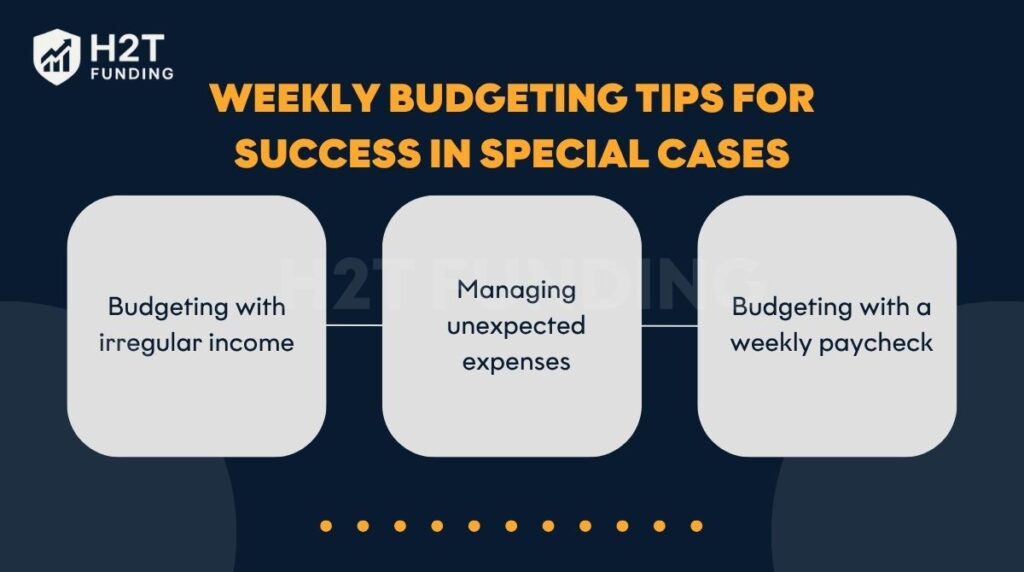
6.1. Budgeting with irregular income
Managing irregular income can be tough, but weekly and low-income budgeting tools help you stay on track. For a deeper guide on this topic, check out our article on how to budget with irregular income to learn effective ways to manage inconsistent earnings.
- Keep a close track of every payment: When your income varies, it’s crucial to record every dollar you receive, no matter how small or irregular. This helps you understand your actual cash flow week by week.
- Prioritize essential expenses: Identify your fixed monthly costs like rent, utilities, and groceries, and make sure these are covered first before discretionary spending.
- Build a buffer during high-income weeks: Whenever you have a week with a big paycheck, save a good portion of it to cover lean weeks, reducing stress when income dips.
- Use percentage-based budgeting: Instead of assigning fixed amounts, allocate percentages of your income (e.g., 50% needs, 20% savings, 30% wants) so your budget flexes naturally with fluctuating earnings.
- Be flexible week to week: Adjust your spending weekly depending on how much you actually earn; some weeks may require tightening, others may allow more freedom.
A friend of mine who freelances in marketing told me, Some weeks I’m swamped with projects, other weeks almost nothing. I always save around 25% of my income during busy weeks and cover my rent and bills first. For personal spending, I adjust based on what’s left. This approach keeps me from scrambling for money when work slows down. This shows how weekly budgeting tips tailored for irregular income can create financial stability.
6.2. Managing unexpected expenses
Unexpected expenses are a classic stress test for any budget. A sudden car repair or medical bill can easily derail months of progress if there’s no buffer in place. To avoid this, you should:
- Setting aside a small weekly emergency fund: Even just $10-$20 a week builds up quickly and reduces the risk of going into debt.
- Creating a “flexible spending” category: Budgeting a small percentage of income for miscellaneous or surprise expenses means you’re prepared without derailing your entire budget.
- Weekly budget reviews: Looking over expenses every week helps catch any unexpected costs early so you can adjust without stress.
- Using credit wisely: Having a credit card as a last resort is fine, but the goal is to cover surprises from your savings whenever possible.
For example, picture a scenario where a significant car repair is needed just before a planned vacation. Without a dedicated emergency fund, the individual faces a difficult choice: cancel the trip or incur debt.
However, the person who has consistently set aside a small amount each week for this very contingency faces a manageable problem, not a crisis. This demonstrates how proactive saving transforms a potential financial shock into a mere inconvenience, preserving both financial health and peace of mind.
6.3. Budgeting with a weekly paycheck
Getting paid weekly offers unique opportunities for precise budgeting but requires discipline to avoid overspending. Here’s how to make it work:
- Use the paycheck budgeting method: Create a paycheck budget by dividing monthly expenses into weekly segments. For example, if your monthly rent is $1,200, allocate $300 per week (assuming four paychecks). Use a calendar to map out due dates for bills and assign them to specific paychecks.
- Adopt zero-based budgeting: Assign every dollar from each weekly paycheck to a specific category (e.g., bills, savings, groceries) so your income minus expenses equals zero. For instance, if your weekly paycheck is $800, allocate $300 to rent, $100 to groceries, $50 to savings, and so on. This method maximizes control and prevents overspending.
- Combine with the cash envelope system: For variable expenses like groceries or entertainment, use the cash envelope system. Withdraw cash for each category after receiving your paycheck (e.g., $100 for groceries, $50 for fun). Once the envelope is empty, stop spending in that category until the next paycheck.
- Track spending weekly: Review your spending every week to ensure you’re on track. Use a budgeting app or spreadsheet to log transactions daily and compare them to your paycheck budget.
For a broader view of your financial progress, check out our detailed guide on how to track net worth to see how your weekly budgeting tips contribute to long-term financial awareness. If you overspend in one category (e.g., $120 on groceries instead of $100), adjust other categories (e.g., reduce entertainment by $20) to stay balanced.
Pro Tip: If you receive four paychecks most months but five in some months, treat the extra paycheck as a bonus. Use it to boost your emergency fund, pay down debt, or fund a financial goal like a vacation.
7. Weekly budget templates and tools
Implementing a weekly budgeting system can significantly enhance your financial control. Utilizing the right budgeting templates and tools simplifies the process, making it more efficient, personalized, and supportive of your financial well-being.
7.1. Downloadable weekly budget templates
If you prefer managing your budget offline or want a simple way to plan without distractions, downloadable templates are a great starting point. They provide a clear layout for tracking your weekly income, expenses, and savings in one place.
- Microsoft Create: Customizable templates for visualizing your weekly budget.
- TheGoodocs: Free weekly budget templates compatible with Google Docs and Excel.
- Vertex42: Excel budget planners and weekly budget templates in Excel for detailed expense tracking.
- WeeklyBudgeting.com: Tools to calculate safe spending and monitor weekly expenses.
7.2. Recommended apps for tracking weekly expenses
For those who want to track spending on the go, budgeting apps offer convenience and real-time updates. You can explore our detailed roundup of the best budgeting apps 2026 to find tools that fit your needs. Many apps also send reminders and help adjust your budget as your financial situation changes.
| App Name | Key Features | Pricing |
|---|---|---|
| YNAB | Zero-based budgeting, detailed expense tracking | $109/year or $14.99/month; 34-day free trial available |
| EveryDollar | Simple zero-based budget, syncs with bank | $79.99/year or $17.99/month; 14-day free trial available |
| Simplifi by Quicken | Cash flow projections, spending plan adjustments | $71.88/year or $5.99/month; 30-day free trial available |
| Weekly | Weekly budget cycle, bill reminders, bank sync | Free; Premium features available |
| Spending Tracker | Easy spending input, clear charts | Free; Pro version available for $2.99 |
| Goodbudget | Envelope budgeting system, shared budgets | Free; Premium plans range from $5.99/month to $9.99/month, or $49.99/year to $79.99/year |
*Note: Prices are subject to change. Please visit the official website for the latest information.
Read more:
8. Things to keep in mind when adjusting your weekly budget
Adjusting your weekly budget is a normal and necessary part of effective money management. Life changes, expenses fluctuate, and your goals evolve; your budget should adapt with them. Here are key things to keep in mind when making adjustments:
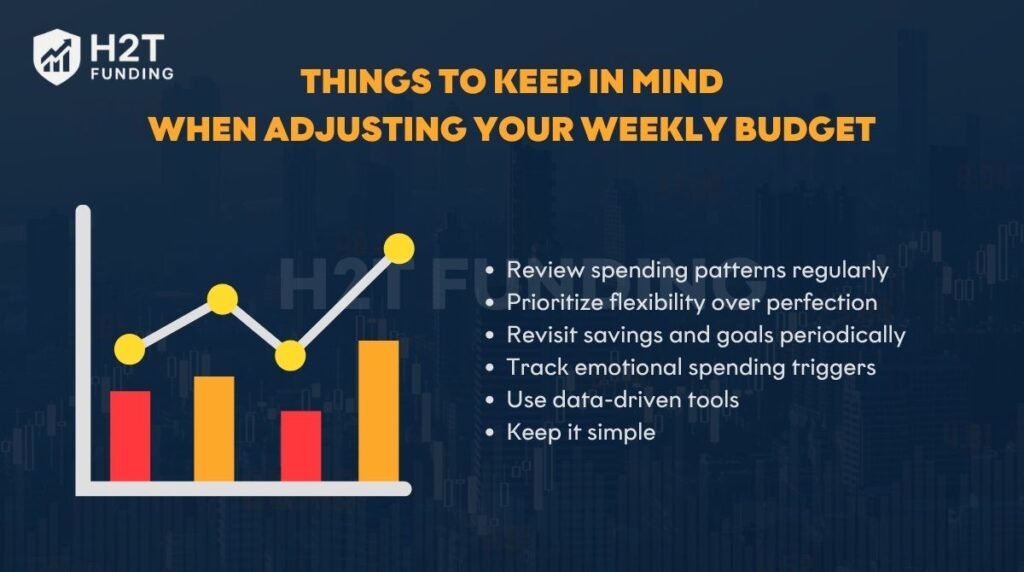
- Review spending patterns regularly: Look back at your spending every week or two to spot trends. If one category, like dining out or groceries, consistently exceeds your plan, rebalance it instead of cutting drastically. This keeps your budget realistic and sustainable.
- Prioritize flexibility over perfection: A budget isn’t meant to be rigid. Unexpected costs like car repairs or medical bills will happen, so leave a small buffer (around 5–10% of your income) for adjustments without stress.
- Revisit savings and goals periodically: As your income or expenses change, update your savings targets. If you get a raise, consider boosting your savings rate or debt payments before increasing discretionary spending.
- Track emotional spending triggers: Impulse buys often happen out of boredom or stress. Identifying your triggers helps you stay mindful and prevents repeated overspending.
- Use data-driven tools: Budgeting apps and spreadsheets can reveal spending patterns faster than manual tracking. Review your dashboard weekly to make informed tweaks instead of guessing where the money went.
- Keep it simple: Adjust one or two categories at a time instead of overhauling your entire budget. Gradual changes are easier to maintain and prevent burnout.
A strong weekly budget isn’t about perfection; it’s about progress and adaptability. Regularly reviewing, tweaking, and staying aware of your spending ensures your budget continues to serve your goals, even as your financial situation evolves.
9. FAQs about weekly budgeting tips
Focus on essentials like groceries, transportation, and bills. Set aside money for savings and discretionary spending, then review and adjust your budget every week to stay on track.
Budget enough to cover your fixed and variable expenses, plus savings. A good starting point is to divide your monthly income by 4.3 and adjust based on your spending habits.
Weekly budgeting offers more frequent control and quicker adjustments; biweekly budgeting aligns better if you get paid every two weeks. Choose based on your pay schedule and personal preference.
Prioritize essential expenses first, then allocate the remainder to savings and discretionary spending. Make sure your needs are covered before spending on wants.
Creating or reviewing your budget weekly or monthly is best. Weekly budgets allow quick tweaks, while monthly budgets give a big-picture view. Daily budgeting can help track spending, but it isn’t necessary for everyone.
To save $10,000 in a year, you need to set aside about $192 each week ($10,000 ÷ 52 weeks). Automate transfers to a savings account right after payday, cut nonessential expenses, and track progress weekly to stay consistent.
A realistic weekly budget fits your income and lifestyle while covering needs, wants, and savings. For most people, the 50/30/20 rule works well 50% for essentials, 30% for wants, and 20% for savings or debt repayment.
The 50/30/20 rule is a simple budgeting method: 50% for necessities like housing, food, and bills 30% for discretionary spending, such as entertainment 20% for savings and debt repayment It helps maintain balance and long-term financial stability.
It depends on your income and spending habits. Weekly budgeting offers tighter control and frequent check-ins, ideal if you get paid weekly or tend to overspend. Monthly budgeting works better for people with stable incomes and predictable expenses.
10. Conclusion: Take charge of weekly budgeting
Weekly budgeting tips are a powerful tool that helps you stay in control of your finances and improve your financial awareness. Whether you’re learning to make a weekly budget or define a good one, consistent tracking boosts your financial well-being.
By tracking your money every week, you gain better clarity, flexibility, and the ability to quickly adapt to unexpected changes.
The key is to start small, try different weekly budgeting tips, and budgeting tips to save money until you find a method that fits your lifestyle and income pattern. Whether you have a steady paycheck or irregular earnings, budgeting weekly keeps you aware of your spending habits and makes financial planning less overwhelming.
Ready to take control of your money? Begin applying these weekly budgeting strategies today and watch your financial confidence grow.
For more insights and practical advice, explore other articles in the Budgeting Strategies section at H2T Funding. From investment tips to debt management, our expert guides are designed to help you build a stronger financial future.





